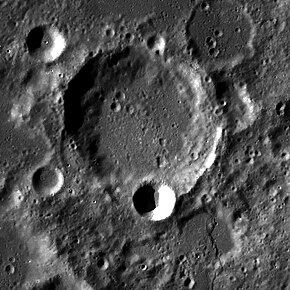
LRO WAC image | |
| Coordinates | 49°00′S 101°18′E / 49.0°S 101.3°E |
|---|---|
| Diameter | 57 km |
| Depth | Unknown |
| Colongitude | 260° at sunrise |
| Eponym | Dmitry N. Anuchin |


Anuchin is a lunar impact crater that lies on the southern hemisphere on the far side of the Moon. It is located to the south of the larger crater Lamb, and to the north-northwest of Kugler.
The rim of Anuchin remains relatively sharply defined, although it has been subject to wear due to subsequent impacts. The satellite crater Anuchin L lies astride the southern rim, but the otherwise the outer wall is not significantly incised. The interior floor is nearly featureless, with no central peak at the midpoint and only a few tiny craterlets. But it does not possess the darker hue of a crater interior that has been resurfaced by lava flows.
By convention these features are identified on lunar maps by placing the letter on the side of the crater midpoint that is closest to Anuchin.
| Anuchin | Latitude | Longitude | Diameter |
|---|---|---|---|
| B | 46.7° S | 103.3° E | 24 km |
| L | 50.2° S | 101.7° E | 15 km |
| N | 51.6° S | 99.6° E | 33 km |
| Q | 51.1° S | 98.3° E | 50 km |
| V | 48.1° S | 99.6° E | 15 km |
- Andersson, L. E.; Whitaker, E. A. (1982). NASA Catalogue of Lunar Nomenclature. NASA RP-1097.
- Blue, Jennifer (July 25, 2007). "Gazetteer of Planetary Nomenclature". USGS. Retrieved 2007-08-05.
- Bussey, B.; Spudis, P. (2004). The Clementine Atlas of the Moon. New York: Cambridge University Press. ISBN 978-0-521-81528-4.
- Cocks, Elijah E.; Cocks, Josiah C. (1995). Who's Who on the Moon: A Biographical Dictionary of Lunar Nomenclature. Tudor Publishers. ISBN 978-0-936389-27-1.
- McDowell, Jonathan (July 15, 2007). "Lunar Nomenclature". Jonathan's Space Report. Retrieved 2007-10-24.
- Menzel, D. H.; Minnaert, M.; Levin, B.; Dollfus, A.; Bell, B. (1971). "Report on Lunar Nomenclature by the Working Group of Commission 17 of the IAU". Space Science Reviews. 12 (2): 136–186. Bibcode: 1971SSRv...12..136M. doi: 10.1007/BF00171763. S2CID 122125855.
- Moore, Patrick (2001). On the Moon. Sterling Publishing Co. ISBN 978-0-304-35469-6.
- Price, Fred W. (1988). The Moon Observer's Handbook. Cambridge University Press. ISBN 978-0-521-33500-3.
- Rükl, Antonín (1990). Atlas of the Moon. Kalmbach Books. ISBN 978-0-913135-17-4.
- Webb, Rev. T. W. (1962). Celestial Objects for Common Telescopes (6th revised ed.). Dover. ISBN 978-0-486-20917-3.
- Whitaker, Ewen A. (1999). Mapping and Naming the Moon. Cambridge University Press. ISBN 978-0-521-62248-6.
- Wlasuk, Peter T. (2000). Observing the Moon. Springer. ISBN 978-1-85233-193-1.
-
 Media related to
Anuchin (crater) at Wikimedia Commons
Media related to
Anuchin (crater) at Wikimedia Commons

LRO WAC image | |
| Coordinates | 49°00′S 101°18′E / 49.0°S 101.3°E |
|---|---|
| Diameter | 57 km |
| Depth | Unknown |
| Colongitude | 260° at sunrise |
| Eponym | Dmitry N. Anuchin |


Anuchin is a lunar impact crater that lies on the southern hemisphere on the far side of the Moon. It is located to the south of the larger crater Lamb, and to the north-northwest of Kugler.
The rim of Anuchin remains relatively sharply defined, although it has been subject to wear due to subsequent impacts. The satellite crater Anuchin L lies astride the southern rim, but the otherwise the outer wall is not significantly incised. The interior floor is nearly featureless, with no central peak at the midpoint and only a few tiny craterlets. But it does not possess the darker hue of a crater interior that has been resurfaced by lava flows.
By convention these features are identified on lunar maps by placing the letter on the side of the crater midpoint that is closest to Anuchin.
| Anuchin | Latitude | Longitude | Diameter |
|---|---|---|---|
| B | 46.7° S | 103.3° E | 24 km |
| L | 50.2° S | 101.7° E | 15 km |
| N | 51.6° S | 99.6° E | 33 km |
| Q | 51.1° S | 98.3° E | 50 km |
| V | 48.1° S | 99.6° E | 15 km |
- Andersson, L. E.; Whitaker, E. A. (1982). NASA Catalogue of Lunar Nomenclature. NASA RP-1097.
- Blue, Jennifer (July 25, 2007). "Gazetteer of Planetary Nomenclature". USGS. Retrieved 2007-08-05.
- Bussey, B.; Spudis, P. (2004). The Clementine Atlas of the Moon. New York: Cambridge University Press. ISBN 978-0-521-81528-4.
- Cocks, Elijah E.; Cocks, Josiah C. (1995). Who's Who on the Moon: A Biographical Dictionary of Lunar Nomenclature. Tudor Publishers. ISBN 978-0-936389-27-1.
- McDowell, Jonathan (July 15, 2007). "Lunar Nomenclature". Jonathan's Space Report. Retrieved 2007-10-24.
- Menzel, D. H.; Minnaert, M.; Levin, B.; Dollfus, A.; Bell, B. (1971). "Report on Lunar Nomenclature by the Working Group of Commission 17 of the IAU". Space Science Reviews. 12 (2): 136–186. Bibcode: 1971SSRv...12..136M. doi: 10.1007/BF00171763. S2CID 122125855.
- Moore, Patrick (2001). On the Moon. Sterling Publishing Co. ISBN 978-0-304-35469-6.
- Price, Fred W. (1988). The Moon Observer's Handbook. Cambridge University Press. ISBN 978-0-521-33500-3.
- Rükl, Antonín (1990). Atlas of the Moon. Kalmbach Books. ISBN 978-0-913135-17-4.
- Webb, Rev. T. W. (1962). Celestial Objects for Common Telescopes (6th revised ed.). Dover. ISBN 978-0-486-20917-3.
- Whitaker, Ewen A. (1999). Mapping and Naming the Moon. Cambridge University Press. ISBN 978-0-521-62248-6.
- Wlasuk, Peter T. (2000). Observing the Moon. Springer. ISBN 978-1-85233-193-1.
-
 Media related to
Anuchin (crater) at Wikimedia Commons
Media related to
Anuchin (crater) at Wikimedia Commons
